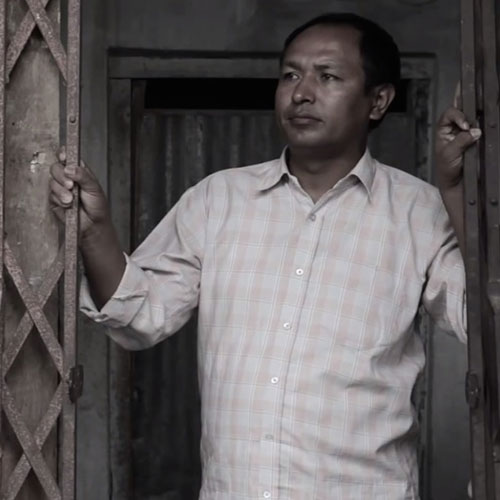Teacher and farmer disappeared and tortured in 2003-2005
FACTS

In November 2003, members of the Royal Nepal Army dragged Dev Bahadur Maharjan, a teacher and farmer, from his house in the middle of the night. He was held illegally until January 2005, and for nearly a year his family did not know whether he was dead or alive. Dev Bahadur Maharjan was beaten severely during interrogations, forced to watch the execution of an inmate, and subjected to horrific conditions of detention, including almost continual blindfolding and hooding.
Read more: here
Procedure
Dev Bahadur Maharjan was only released from detention after his sister filed a petition for habeas corpus in the courts. Dev Bahadur Maharjan remains unable to file a criminal complaint of torture or enforced disappearance in Nepal, as these are not considered crimes under Nepali Law. He made a complaint to the National Human Rights Commission of Nepal, but no investigation was undertaken.
In 2008, Dev Bahadur Maharjan took his case to the Human Rights Committee, represented by Advocacy Forum Nepal and supported by REDRESS. The Human Rights Committee reached a decision in July 2012.
It found that Dev Bahadur Maharjan was a victim of illegal detention, enforced disappearance and torture at the hands of the Royal Nepal Army. In addition, it found that the anguish and distress caused to his family by the disappearance also violated the prohibition of torture and other ill-treatment.
Read the decision: English Nepali
RECOMMENDATIONS
The Human Rights Committee recommended that Nepal carry out a thorough and diligent investigation and prosecute and punish those responsible. It also recommended that Nepal provide Dev Bahadur Maharjan and his family with adequate compensation. In addition, it called on Nepal to criminalise torture and to repeal all laws granting impunity to those alleged responsible for torture and enforced disappearance. Nepal is also under an obligation to prevent similar violations in the future, and must translate and disseminate the decision.
| Investigation of the facts and prosecution and sanctions of the perpetrators | |
| Nepal has failed to adopt measures with regards to the investigation, prosecution and sanction of those responsible. Nepal continues arguing that investigation into conflict-related crimes must be carried out by transitional justice bodies in spite of the well-established case law of the Committee that recall that transitional justice mechanism cannot replace judicial remedies in cases of gross human rights violations | |
| Provision of adequate compensation | |
| Although the government considers support of the interim relief as compensation, such support cannot replace the compensation victims should receive. Mr. Maharjan has not received any form of compensation for the harm suffered. | |
| Amendment of legislation on torture and enforced disapperances | |
| Albeit the new Criminal Code (entered into force in 2018) codifies the autonomous offences of torture and enforced disappearance, the definitions of the crimes enshrined therein and the corresponding regulation – concerning, for instance, statutes of limitation and compensation – remains at odds with international law. | |
| Protection from reprisals | |
| Dev Bahadur Maharjan is not known to have been subjected to reprisals, although his representatives are not aware of any particular measures being taken to mitigate any potential risks. | |
| Translation & dissemination | |
| The Views of the Human Rights Committee on this communication have been translated into Nepali but not disseminated widely. |
Note these are unofficial gradings as the Human Rights Committee has not yet commented on implementation.
EFFORTS FOR IMPLEMENTATION
- Shadow Report to UN Human Rights Committee on Implementation, February 2014 (English)
- Meeting between Dev Bahadur Maharjan’s representatives and the Government to discuss his case
- Letters to the Human Rights Committee July 2014
- Meeting with Human Rights Committee November 2015
